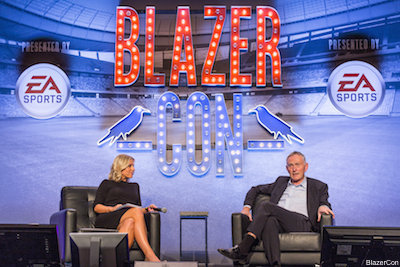Michael Davies and Roger Bennett took a leap of faith. The originators of the "Men in Blazers" podcast hosted BlazerCon, a two-day soccer fan convention this past weekend in Brooklyn. The two Brits, who have each spent about half their life in the United States, gambled on Americans to show their interest in soccer.
Here are 11 takeaways from BlazerCon:
1. There is soccer interest in America
BlazerCon tickets were not cheap. Fans could buy "Very Good Friends of the Podcast" VIP seats for $425 or "Great Friends of the Podcast" admission for $225. Students and military tickets were discounted to $125, but other than that, there was no way around the hefty price. Food and drinks cost extra, unless fans were lucky enough to get a free pie from Davies or Bennett for running around the venue. On top of that, the convention featured no actual live soccer other than the broadcast of the U.S.-Saint Vincent and the Grenadines World Cup qualifier match Friday night.
The event revolved around roughly 16 hours of panels, including two "Men in Blazers" live shows. And yet, 1,300 people bought tickets and packed multiple stages for two days. If there was any complaining, it was masked by two days' worth of applause.
2. The world sees soccer value in the U.S.
The opening keynote of BlazerCon included Rebecca Lowe, a displaced Brit who anchors NBC's Premier League coverage, and Richard Scudamore, executive chairman of the Premier League. "America is football's true global home," Scudamore says. Although Americans do not have the team loyalty of Brits, Scudamore reported twice as many of them tuned into a Premier League game in the last year than Brits. Think about that. Despite location and history, Britain can only do so much for the Premier League. Americans have more fans and more money to be thrown at soccer. The United States has a greater soccer variety of television than most countries in the world.
"I go home to England, where I was a few weeks ago, and I talk to my brother and say, 'let's watch the game,'" says Peter Moore, the American-based British COO of EA Sports. "He says, 'I don't know if it's on because the BBC Sport and Sky Sports, they have the rights.' We are so lucky in this country. We've gone from rags to riches."
Accept and indulge it, Americans: We are media junkies. We consume everything. The amount of people, cable channels, streaming services and merchandise outlets make the U.S. a sexier setting to spend advertising dollars than in Europe itself. Led by the Premier League, European leagues are throwing their brands across the pond.
3. The U.S. Women's National Team is the hottest ticket in the U.S. right now
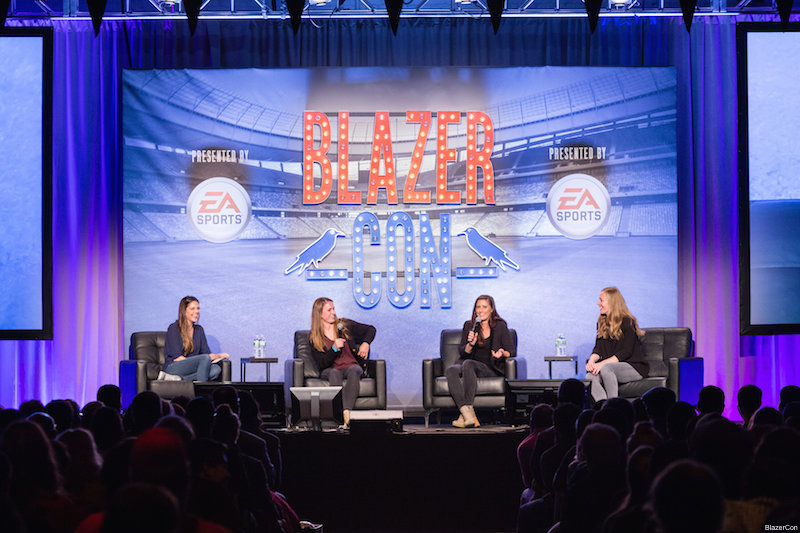
Davies and Bennett focus their podcast (and weekly TV show on NBCSN) on the Premier League, while incorporating MLS, international competition (male and female) and other leagues into their program. Only one panel was dedicated to discuss women's soccer. But it was the loudest, giddiest, most riveting hour of the weekend.
At 5:30 p.m. Saturday, the second-to-last time slot, rising media star Katie Nolan of Fox Sports sat down with USWNT heroes Heather O'Reilly, Ali Krieger and Becky Sauerbrunn. The three players were met with a standing ovation and chants of U-S-A! U-S-A! At this point, they are used to it. They are the inspiration to tens of thousands of girls across the country.
"This team taught all of America's children that playing like a girl means you’re a badass," Barack Obama said when the team came to the White House.
But it is not just girls. Men admire this team too. "It was so surreal just seeing the people out there, a lot of young people, but also a lot of old people in the buildings and out their windows," Krieger said of the summer's ticker tape parade in New York City, the first ever for a female sports team.
When Nolan opened up the room for questions, the first hand was raised by a man. He told the room he has a 2-year-old daughter and asked when Nike will make more USWNT jerseys in men's sizes, so his daughter can see him wearing a jersey. The question was met with cheers.
4. Putting women's players in FIFA 16 was the right move
I live tweeted everything I could from BlazerCon all weekend. But no tweet got as much engagement as this one:
U.S. Women's National Team is the 23rd most played team in @EASPORTSFIFA 16. There are roughly 600 teams. @petermooreEA #BlazerCon
— Jeffrey Eisenband (@JeffEisenband) November 14, 2015
To clarify, this news came from EA Sports COO Peter Moore. Globally, the USWNT was the 23rd-most played team in FIFA 16, of approximately 600 options, as of Nov. 14. The game was released in late September. The USWNT has only played two games since then. All European leagues are in-season.
This just underscores how hot U.S. Women's National Team Soccer is and how much people care about it.
In other news, Alex Morgan became the first female in EA Sports FIFA to score 1 million goals.
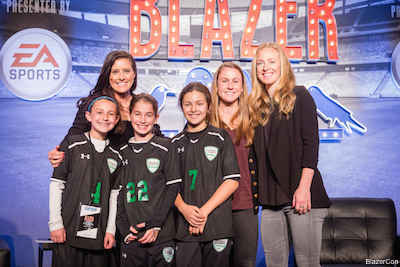
5. MLS Owners are really confident
In a weekend full of Premier League Team CEOs and European League executives, the most opinionated panel featured U.S. soccer star-turned mega-analyst Alexi Lalas and three MLS team owners, Jonathan Kraft (New England Revolution), Joe Roth (Seattle Sounders) and Phil Rawlins (Orlando City SC). The "MLS at 40" panel challenged the three owners to depict MLS in 2035.
In a comedic moment, Kraft said MLS has passed one of the four U.S. major sports leagues. He refused to announced the league, but the brash Roth, a film executive, made the statement loud and clear with this exchange:
"Twenty years from now, MLS will be the No. 2 sport in the country, only pro football will be above it," Roth said.
"Good answer," said Kraft, whose family also owns the New England Patriots. (Jonathan is Robert Kraft's son).
"It's already passed baseball, which he did not have the guts to say," Roth said with a laugh. "And it's on its way to passing the NBA."
Whether fans, journalists and other members of the soccer community agree with this is irrelevant. Even if MLS owners do not believe this, they are portraying that confidence on the outside.
"If you blindfold, forgive me for saying this, a Eurosnob, because there's some out there, and drop them into Portland or drop them into Seattle or Orlando right now and say where are you, they wouldn't know," Rawlins said. "They'd think they're in Dortmund or they'd think there in Milan or Buenos Aires, and they're in North America."
Rawlins was previously a part owner of Stoke City of the Premier League, so he is an owner who has seen both the European and MLS side. Like the Frank Lampards and Steven Gerrards of the world, he has transitioned to America.
6. MLS denounces relegation
An overall theme of BlazerCon's MLS-based panels was a denouncement of relegation. Both the owners and Garber unofficially labeled relegation as "un-American."
"Americans like winners," Roth said. "They're addicted to winners. I think that if the Premier League started today, I don't think they'd have relegation.
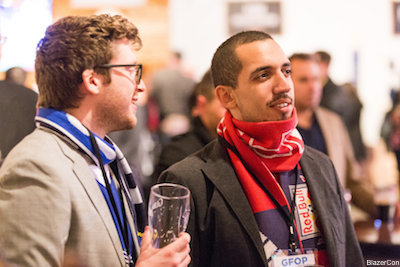
"This soccer league is in the United States," Kraft said. "The United States is about having top tier teams in all their sports and then there are minor leagues to support all those sports. That's what works in this country and in this culture."
MLS is a single entity with a fixed number of teams, as opposed to European professional soccer leagues, which function with a series of domestic tiers.
In MLS Commissioner Don Garber's mind, the concept is outdated.
"Promotion and relegation was created in the 1800s," he said. "It was a system that existed because there was no other way that existed to create good competition. They were amateur teams. If you were to create professional football in England or Italy or Spain today, I don't believe you'd have promotion and relegation. We need to create a league that works for the fan base in this market.
"Nobody looks at the NFL and says it's not working because there's no promotion and relegation."
Can anyone imagine professional American teams losing their place on the top tier after a bad season? Instead, America provides its bottom-dwellers with draft picks and small market teams with compensation. Playoffs are a specifically American concept.
"If you're investing billions and billions of dollars, which we are now at about $3.5 billion invested [in MLS] in twenty years, to build something in Kansas City and they have a s***ty season, to think they might be playing in Chattanooga in a stadium of 4,000 people on a crappy field with no fans, makes no sense," Garber adds.
Promotion and relegation would foil tanking attempts, but it could also displace stars. Imagine Kobe Bryant and Carmelo Anthony toiling away in a second tier league right now.
7. MLS is building a league brand, not team brands
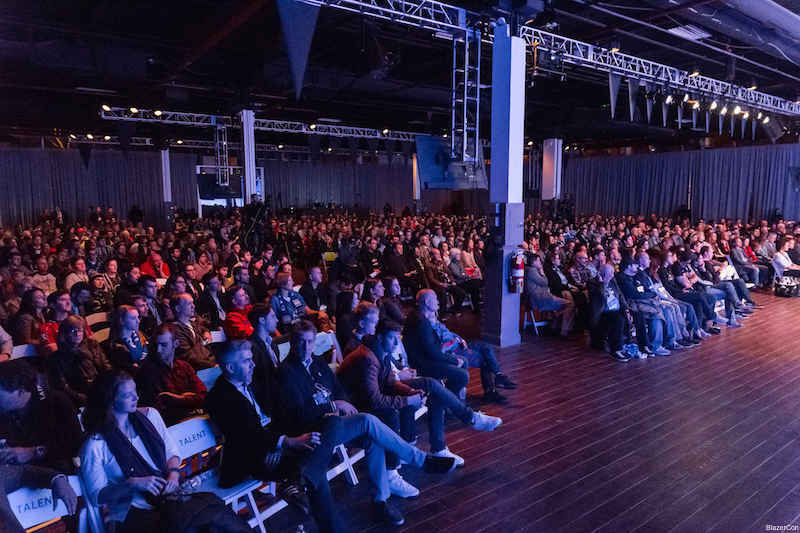
If MLS is not about promotion and relegation, how will it compete with European teams? Most European leagues have no salary cap in free market-based leagues. The high spending teams spend as much as possible to attain the best players. Last spring, when the International Business Timesranked the ten professional sports teams with the highest average annual salaries, eight were European sports teams. The other two were the Dodgers and the Yankees.
The MLS CBA established in March allows for a salary cap of $3.5 million. However, the designated player rule lets teams sign three players for contracts outside the salary cap (as of 2015, only $436,250 of a designated player's contract counts toward the salary cap).
Theoretically, if MLS abolished the salary cap (the new CBA lasts through 2020 and Garber will not even entertain questions about the numbers), the big market teams, e.g. NYCFC, Los Angeles Galaxy, Toronto FC, could lift their spending to European levels. In a parallel universe, the Los Angeles Galaxy can pull players from say, Arsenal, and compete at a global level.
But that is not what MLS is about.
"To what end?" Garber asks of creating a system that allows MLS teams to compete financially with European teams. "So that they win the championship? Is that going to make the league better? Then everybody would want to do that because they want to win. Now, all of a sudden you've taken a model that has driven almost unprecedented success for soccer in America and destroyed it for what end game? So that people will think LA is as good as Chelsea? I don't see the value of that for what we're trying to do, which is to build a league that ultimately, in its entirely, that can be competition with the rest of the world. One team can't do that.
"The fact is that every fan, at the beginning of the season, in MLS, thinks that their team can win a championship. That is not the case in just about any other league. You have a pretty good sense if you are a fan of a particular team that there is a really low chance you're going to be left in that cup trophy race at the end of the year [in Europe]."
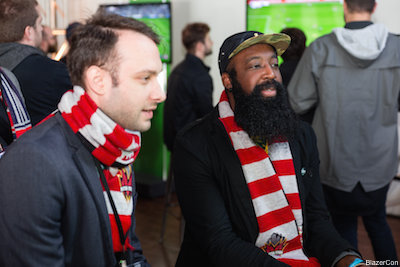
The moral of the argument: Professional soccer in America is not about the clubs, but about the league. MLS is a singular unit, as opposed to European leagues, which are temporary fusions of independent clubs.
8. USMNT alumni care about the team
Brad Friedel summed up the state of the U.S. Men's National Soccer Team in short, honest terms.
"Do I think we'll qualify for the World Cup?" he asked. "Yes. Do I think that we'll win the World Cup? No. Do I think we have players in this country ready to win a World Cup? No. I think when you look at our roster, you would ask, do we possess what you'd consider world-class talent? No. Do I think it's been up and down? Absolutely. I think Jurgen Klinsmann will admit it's been up and down if you got him into a small room that isn't out in the open."
Friedel played in three World Cups in 1994, 1998 and 2002. Lalas, who joined him on the "State of U.S. Soccer" panel was on the 1994 and 1998 rosters. Both never played during a time the USMNT was thought of as a legitimate world soccer power (not that it seriously has been considered such in the last decade).
With that said, talk to the two former stars, who both spent parts of their careers exported to clubs in European, and they will analyze the USMNT for hours. They will never have a chance to personally win tournaments again with the USMNT, but they do their service by making it a topic of conversation.
"We were not promised results," Lalas says of Jurgen Klinsmann's tenure as USMNT head coach. "We were promised results with, to use, Jurgen Klinsmann's proactive way of playing, a fundamental change in the wave that the U.S. goes out and plays soccer on a consistent basis, and that's where I have a problem.
"That's fine for you to have a problem, and I'll say not everything that comes out of a manager's mouth is not actually the truth in what he believes," Friedel answered.
The two respectively argued with each other for almost an hour, but the former teammates have the same goal: to make USMNT as strong as it can be. As long as people consider to care, notably alumni, pressure continues to be put on the team to get better.
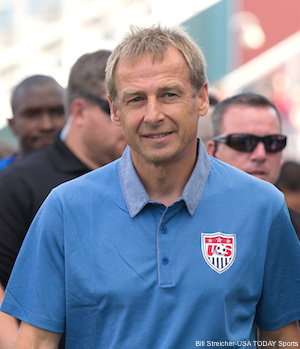
9. Soccer is still the sport of the future
The description for BlazerCon calls soccer "America's sport of the Future since 1972." So when will soccer actually "arrive?"
It is a process, perhaps slower than people thought in 1972, but there is no denying progress. The United States has a functioning league of 20 teams, a men's team that has made seven straight World Cups, a women's team that has won three World Cups and a youth system that makes soccer easily accessible for children.
If that is not enough, the U.S. just hosted its first mega-soccer conference.
Garber's aforementioned points are important. How can soccer success be judged? Is the U.S. trying to create the best teams? The best league? The best international presence? The best fan presence? That is still unknown, but in all categories, the dial is only moving ahead.
It is common to believe soccer is in direct competition with other U.S. major sports. That is not the case. In Europe, soccer is the only major sport, and everything else is second tier. The general interest in sports in the United States encourages fans to follow as many sports as possible. Soccer is not trying to knock anyone off the podium. It is trying break into the same space and make room for a fifth major team sport.
10. Brooklyn was the perfect setting
Could a soccer mega-conference have worked anywhere in the United States? Of course not. New York City was the perfect setting for BlazerCon, and more specifically Brooklyn. BlazerCon featured a variety of outfits, from full soccer uniforms to hipster plaid and beanies to suits and ties. New York features a balance of soccer hooligans, soccer hipsters and wealthy soccer fans, the proper blend to make BlazerCon work. To put it bluntly, BlazerCon featured people who cared (and were willing to put up the money to make a soccer conference work). This was no hub for Wall Street brokers looking for entertainment. With New York being a tourist destination, the conference allowed panelists and fans to make a weekend out of the experience (and set the example for future years).
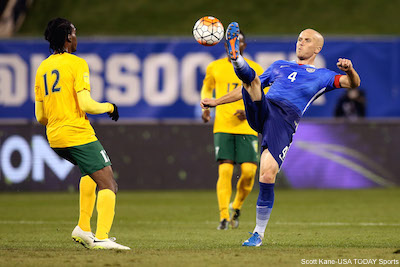
Also, what is more hipster than soccer, street food and Guinness? This was made for Williamsburg in 2015.
11. Michael Davies and Roger Bennett are American heroes
Bennett repeated the same line roughly a dozen times throughout the weekend: "I love America. I wake up every morning and thank God I live here."
Their story in itself is interesting. Davies, president and CEO of the production company Embassy Row, and Bennett met at a 2006 wedding during the World Cup Final. The two soccer nuts bonded over their disgust with the timing of the wedding. In 2010, they started a podcast together, which was eventually picked up by Grantland. They were sent to Rio in 2014 to cover the World Cup for ESPN and after, NBCSN picked them up for a weekly TV program.
What makes Davies and Bennett unique is their embracing of U.S. soccer. Both half-jokingly, half-seriously talk about falling in love with the USMNT around the time Lalas and the 1994 World Cup team played the U.S.-hosted tournament in denim-looking jerseys. They are not bitter types. They have made it their duty to spread soccer -- a term they do use -- in their adopted country.
The BlazerCon turnout proves that two bald men from Britain, who did not even intend to be soccer pundits, can drive a sport's presence in the United States.
Isn't that the American Dream?
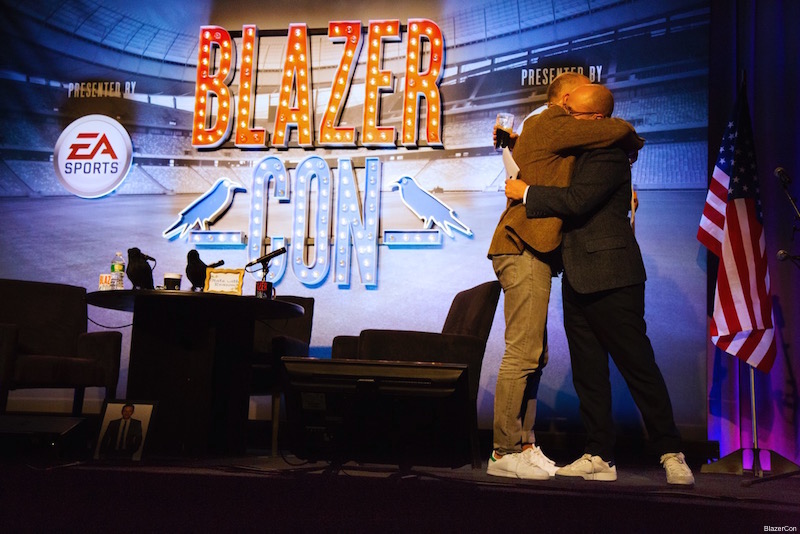
-- Follow Jeffrey Eisenband on Twitter @JeffEisenband.


